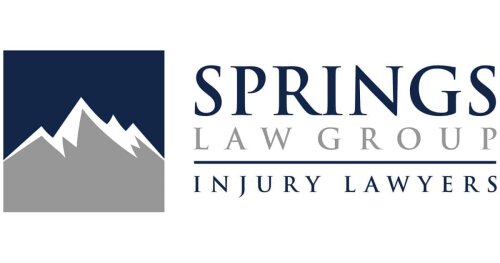
Best Bad Faith Insurance Lawyers in Colorado
Share your needs with us, get contacted by law firms.
Free. Takes 2 min.
Or refine your search by selecting a city:
List of the best lawyers in Colorado, United States

About Bad Faith Insurance Law in Colorado, United States
Bad faith insurance law in Colorado addresses instances when an insurance company fails to deal with a policyholder fairly or does not fulfill its contractual obligations. When you purchase insurance, you enter into a contract that requires the insurer to investigate, process, and pay valid claims in good faith. If an insurer delays, denies, or underpays a valid claim without a reasonable basis, they may be acting in bad faith. Colorado law provides remedies for policyholders who are victims of this behavior, holding insurance companies accountable for unfair practices.
Why You May Need a Lawyer
Insurance disputes can be complicated and intimidating. You may need a lawyer specializing in bad faith insurance in Colorado if you encounter situations such as:
- Your legitimate claim is denied without a clear or reasonable explanation.
- Your insurance company is unresponsive or continuously delays addressing your claim.
- You feel pressured to accept a settlement far below what your policy should provide.
- The insurer is misrepresenting policy terms or failing to adequately explain your coverage.
- There is evidence that the insurer conducted an inadequate investigation of your claim.
A lawyer can help protect your rights, evaluate whether bad faith occurred, and guide you through the necessary steps to pursue rightful compensation.
Local Laws Overview
Colorado has specific statutes and regulations in place to protect policyholders from bad faith insurance practices. Key points include:
- Statutory Bad Faith: Colorado Revised Statutes Section 10-3-1115 and 10-3-1116 state that insurance companies must not unreasonably delay or deny payment of claims for benefits owed.
- Consequences for Violations: If an insurer violates these laws, they may be required to pay double the amount of the covered benefit, plus attorney's fees and court costs.
- Common Law Bad Faith: Colorado courts also recognize common law claims. This means you may have additional remedies if an insurer breaches the duty of good faith and fair dealing that exists in every insurance contract.
- Unfair Claims Practices: Colorado Division of Insurance regulates insurance companies and investigates unfair or deceptive acts, such as misrepresenting facts or policy provisions.
The law provides strong consumer protections, but proving bad faith often requires understanding specific legal standards and presenting solid evidence.
Frequently Asked Questions
What is bad faith insurance?
Bad faith insurance occurs when an insurance company unreasonably refuses to honor a legitimate claim, acts dishonestly, or fails to fulfill contractual obligations to the policyholder.
How can I tell if my insurance company acted in bad faith?
Warning signs include denial of a claim without reasonable explanation, delayed payment, minimal investigation, or offering settlement amounts well below what you are owed.
What damages can I recover in a bad faith claim in Colorado?
You may be able to recover up to two times the covered benefit, attorney's fees, court costs, and sometimes additional damages if the insurer's conduct was particularly egregious.
Can I sue my insurance company directly for bad faith?
Yes, Colorado law allows individuals to sue their own insurance company if it engages in bad faith practices, whether the company provides property, health, auto, or other types of insurance.
Does the type of insurance matter in a bad faith case?
No, bad faith laws apply to all types of insurance, though each may have unique procedures and policy language. Legal guidance is often needed to interpret your exact coverage.
What should I do if I suspect bad faith by my insurer?
Document all communications and correspondence with your insurer, gather evidence of your claim, and consult a lawyer experienced in insurance law as soon as possible.
Is there a time limit to file a bad faith insurance claim in Colorado?
Yes, statutes of limitations apply. Generally, you must take action within two years of discovering the bad faith conduct, but specific timelines may vary based on circumstances.
Will filing a complaint affect my current or future insurance coverage?
Insurers cannot retaliate against you for asserting your legal rights. However, each case is unique, and it is wise to have legal representation before taking formal action.
Does winning a bad faith case mean I automatically receive a payout?
A successful bad faith claim may entitle you to policy benefits plus additional damages, but you must still prove the insurer’s unreasonable conduct and the extent of your losses.
Can a government agency help with my bad faith insurance problem?
State agencies can take consumer complaints and investigate, but they do not represent individuals legally. To recover compensation, you typically need to file a lawsuit with an attorney's help.
Additional Resources
If you need more information or assistance, these resources may help:
- Colorado Division of Insurance - Investigates complaints against insurance companies and provides consumer guidance.
- Colorado Department of Regulatory Agencies (DORA) - Offers resources on insurance regulations and consumer protection.
- Colorado Bar Association - Can help you find qualified lawyers with experience in insurance law and consumer rights.
- United Policyholders - A nonprofit organization providing education and support to insurance consumers.
Next Steps
If you believe you have experienced bad faith insurance practices in Colorado, consider the following steps:
- Review your insurance policy in detail to understand your coverage, exclusions, and claim procedures.
- Gather all supporting documents, correspondence, and notes related to your claim and the insurer's response.
- Contact the Colorado Division of Insurance to file a formal complaint and seek guidance.
- Consult a qualified attorney who specializes in bad faith insurance law in Colorado to discuss the strength of your case and possible legal remedies.
- Keep detailed records of all actions, as these may be crucial if your case progresses to court.
Remember, time limits may apply, so seeking timely legal advice is crucial. An experienced lawyer can evaluate your case, communicate with the insurance company, and protect your rights under Colorado law.
Lawzana helps you find the best lawyers and law firms in Colorado through a curated and pre-screened list of qualified legal professionals. Our platform offers rankings and detailed profiles of attorneys and law firms, allowing you to compare based on practice areas, including Bad Faith Insurance, experience, and client feedback.
Each profile includes a description of the firm's areas of practice, client reviews, team members and partners, year of establishment, spoken languages, office locations, contact information, social media presence, and any published articles or resources. Most firms on our platform speak English and are experienced in both local and international legal matters.
Get a quote from top-rated law firms in Colorado, United States — quickly, securely, and without unnecessary hassle.
Disclaimer:
The information provided on this page is for general informational purposes only and does not constitute legal advice. While we strive to ensure the accuracy and relevance of the content, legal information may change over time, and interpretations of the law can vary. You should always consult with a qualified legal professional for advice specific to your situation.
We disclaim all liability for actions taken or not taken based on the content of this page. If you believe any information is incorrect or outdated, please contact us, and we will review and update it where appropriate.
Browse bad faith insurance law firms by city in Colorado
Refine your search by selecting a city.








